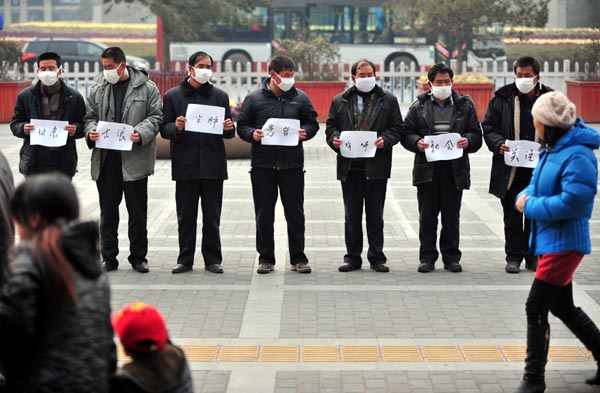Miners seek justice for black lung disease
A total of 124 gold miners in Wuwei city, Northwest China's Gansu province, have been diagnosed with pneumoconiosis but have not received compensation because they had not signed labor contracts with the mine's owners, State broadcaster CCTV reported on Monday.
Pneumoconiosis, also known as black lung disease, is an occupational lung disease caused by dust inhalation, often in mines.
Every year, pneumoconiosis afflicts about 57,000 miners nationwide and kills 6,000, official statistics show.
"Doctors said my lung functioning is no better than an 80-year-old man's. I can't lift a teapot," 36-year-old miner Ma Jiangshan was quoted by CCTV as saying.
Ma was among the most severely ill of the workers, who were found to have pneumoconiosis during occupational disease screening in 2009. Three died from the ailment last year.
All the workers had worked for the Mazongshan Gold Mine in Subei county, Gansu province, where miners said they were exposed to excessive dust without being provided any means of protection.
"Being exposed to mill dust for three weeks can cause ictus pneumoconiosis, which cannot be cured," said Zhang Zhihao, deputy director of the pneumoconiosis rehabilitation center under the State Administration of Coal Mine Safety.
The dust enters the lungs and poisons scavenger cells, damaging lung functioning. The process is irreversible, Zhang said.
But medical treatments can protect undamaged cells and keep the patient's condition from worsening. The procedures cost about 10,000 yuan ($1,517) a person.
But the ailing workers do not even know who should be responsible for covering their medical expenses. The gold mine had 37 owners between 1984 and 2006, 32 of whom are currently out of reach, the report said. The other owners have refused to pay compensation.
"The situation is complex, because we are not sure of under which boss the workers developed pneumoconiosis," said Cao Yanyi, a Jiangsu-based occupational-disease lawyer.
"But I believe the local government should become involved in the case to ensure workers receive sufficient compensation to pay for medical treatments," he said.
However, the local government does not really have the means to force the mine owners to pay out, because most workers could not produce labor contracts. Consequently, they could not prove they had worked there, Wang Xiaomei, head of Subei county's human resources and social security bureau, said.
Cao pointed out many operators did not sign contracts in order to avoid legal responsibilities to the employees.
"But the actual labor relation between the two sides should have been judicially recognized."
The Gansu provincial government has paid the workers 2 million yuan to cover medical costs and is still searching for the mine's owners.
The Ministry of Health also highlighted pneumoconiosis in its 2011 work schedule.
Vice Minister of Health Chen Xiaohong said Tuesday that the government plans to establish centers to diagnose occupational diseases in all prefecture-level cities by the end of the year.
Local governments at the county level should set up occupational disease check-up institutions, Chen told a national meeting on food safety and health inspection in Beijing.
China has fewer than 500 medical institutions capable of diagnosing occupational diseases, 2,272 check-up institutions and 12 provincial-level independent prevention and control institutions for occupational diseases on the mainland.
Chen urged the provincial-level administrations without independent institutions to establish occupational disease centers to strengthen technical expertise and disease prevention training.
Official figures show that between 1983 and 2008, the maximum concentration of coal dust in most coal mines ranged from 198 milligrams to 3,420 milligrams per cubic meter. The range equals 49.5 to 855 times the national standard.
 0
0 







